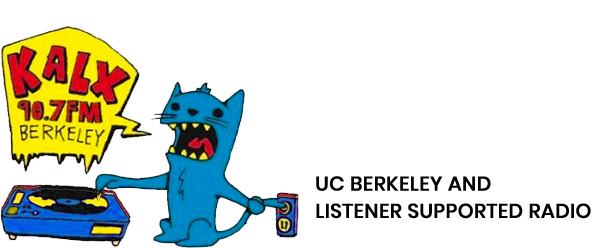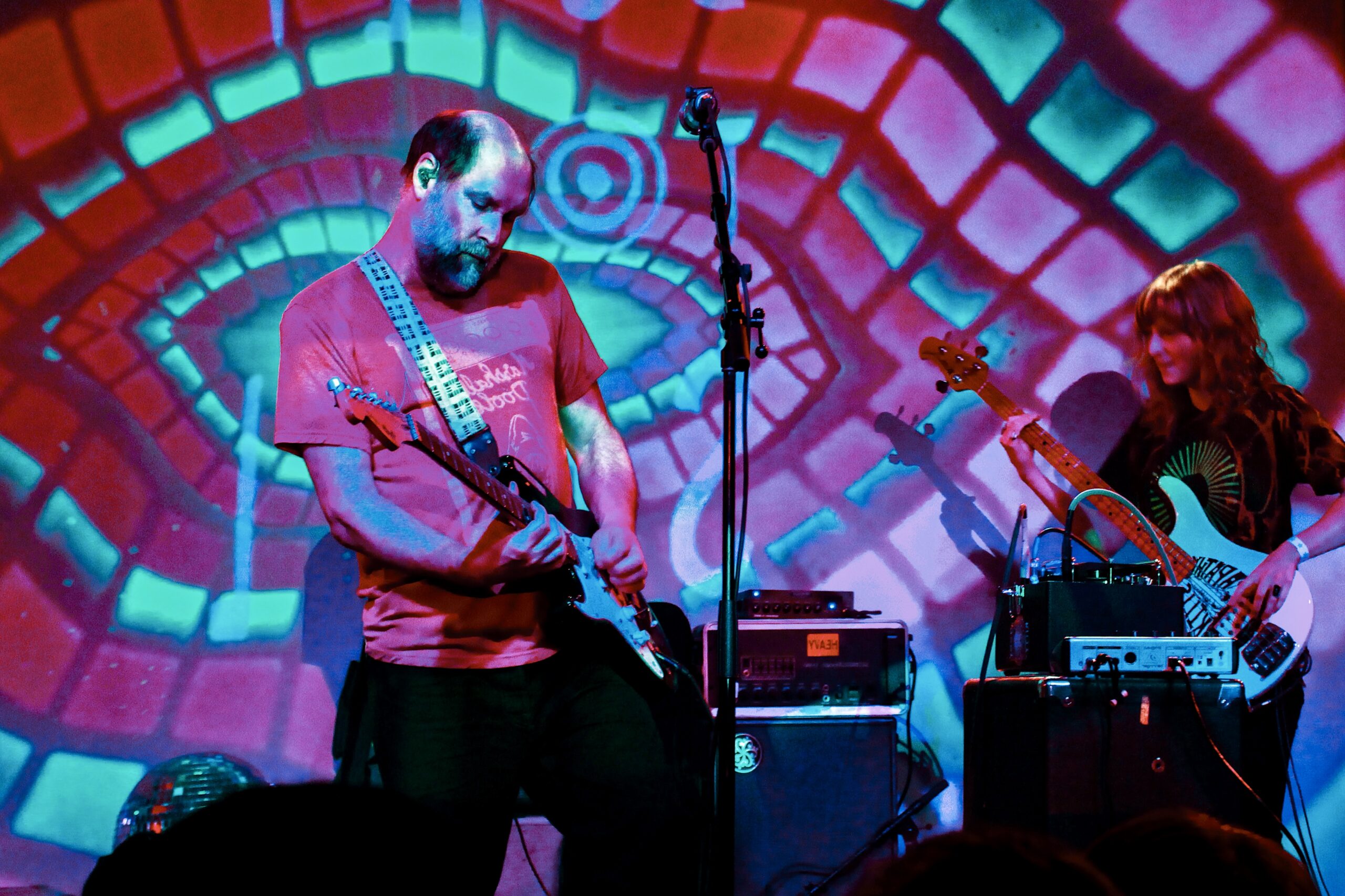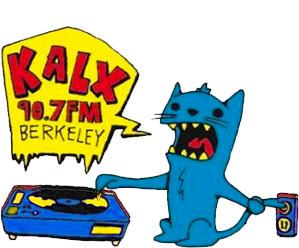Review by David Kim, Photos by Olivia Tai.
People were still filing in when I entered Cornerstone’s concert hall. When you enter, the venue looks pretty unassuming; a small warehouse with lofted ceilings, a bar to your left and stage to your right. Armed with $9 seltzers, my friends and I headed to the front of the stage where, under blue lights and in front of a projection of a Bob Ross episode, Disco Doom was playing an impressionistic instrumental that matched perfectly with the late painter’s relaxing brushstrokes. As the crowd got settled, Mario Kummer began the drums for “Pic Nic,” the snares injecting the venue with energy as Bob Ross made his finishing touches on the mountain landscape behind the stage. Halfway through the set, the soothing guitar riffs gave way to a grungier sound, as Matthias Vetter ripped at the bass over Gabriele De Maria’s airy vocals. Much of their music lended itself to a hypnotic quality — “Hold The Line,” for example, featured clock-like cowbell work, dissonant synth ad-libs, and staccato guitar melodies that kept the crowd mesmerized.
The next band was Orua, a self-proclaimed working-class Krautrock band hailing from Rio De Janeiro. They began with a trance-like instrumental, as frontman guitarist Lê Almeida bent over his guitar, held high right under his chin, almost as if he were playing a violin. The band’s outfits were diverse but reflected their individual contributions well — the synth player sat behind an array of pedals perched on a table, twisting knobs like a mad scientist in a baggy green hoodie and disheveled hair. The bassist, in his polka dotted button-up, provided a tight groove while Lê Almeida, in a loose tee and chinos that wouldn’t look out of place at the Copacabana, played simple yet at times, meandering riffs. The drummer with her tattoos and sleeveless shirt played emphatically, a far cry from the previous more methodical drums of Disco Doom. The music overall was decidedly sharper than the previous act, but the guitarist’s lazy vocals and simple guitar licks gave it an indie flavor. Their setlist was very diverse, oscillating between harder almost punk tracks, to more psychedelic songs like “Pass” (not yet released), which featured Khruangbin-like bass and guitar instrumentals.
After about two hours, Doug Martsch arrived on stage with bassist Melanie Radford and drummer Teresa Esquerra. The stage was comparatively sparse — gone were the synths, table of pedals, the drummer sample pads. Despite the lack of frills, the band’s presence was unmistakable as they dove into their first song, “Strange.” My friends and I, having covered the song last summer in our own band, couldn’t have asked for a more perfect opener; hearing the live, original version of a song we practiced in the garage countless times and had developed our own attachments to was very, very cool.
In his next song, “So,” Doug sang over a wall of rung-out chords in the intro, “Where, where did you go? Why did you leave, what did you know?” before launching into the main riff, his guitar emitting a delicious fuzz that guitarists dream of. Behind the band, the visuals depicted a large grassy field with a herd of black cows on the horizon. At the forefront of the screen was a seated man with a cowboy hat, playing a trombone. One couldn’t help but imagine Doug as the cowboy, playing distortion and reverb-laden guitar riffs in lieu of the brassy notes. By the time he made his last calls: “Where, where did you go?” and dived into his solo, the cows were gathered close around the cowboy trombonist, transfixed. The analogies really do write themselves, huh?
Next, Doug, purposely it must’ve been, juxtaposed the heart rendering lyrics of Reasons with a Youtube video of cats lying in the sun, squinting their eyes and pawing at the screen. This ended up being a common theme throughout his set; our eyes and hearts were blessed with classics like “Cute Animals From Around The World 4K,” “Daily Copyright-Free Visuals Animals Playing In Mud” to enjoy with his songs, the latter during which even Doug turned his back to the audience to take some inspiration from. The visuals gave the music a beautifully child-like quality, where we all dropped our pretensions and enjoyed the music and animals in equal parts.
The one thing that consistently struck me about Built to Spill’s performance was how full and commanding the band’s sound was. Doug played both rhythm and lead, with the bassist easily filling out the sonic space as Doug played his solos. It was very much the style of Built to Spill — delectably simple chords and melodies in expertly crafted songs that manage to straddle the line between simplicity and intrigue, all while carrying a fullness and body characteristic of larger bands. Despite the simplicity of his setup, he showed an impressive versatility in his sound; the bedroom guitarists with a penchant for soloing all lived vicariously through Doug’s free flowing on-stage guitar heroics.
The band’s confidence from decades of touring and live performances was also on full display. When Doug’s string broke during “Distopian Dream Girl,” Melanie held down the bass while Doug went on strumming, his guitar muted, and singing the lyrics. During the solo break, she kept the bass going as Doug unveiled and tuned his next weapon, his classic red Strat, and graced the crowd with a closing solo without a hitch.
Almost every song showcased Doug’s insane guitar prowess, but one of my favorite solos came towards the tail end of his set, during “I Would Hurt A Fly.” Faithful to the energy of his studio recording, but even more brash and spontaneous, his solo laid on heavy doses of wah and distortion that served as a cathartic exclamation mark to the angsty, haunting ballad that came before it. After closing with “You Were Right” (another song with amazingly tragic lyrics) fans on the ground and in the mezzanine were stomping and calling for an encore.
They eventually obliged, playing “Goin’ Against Your Mind,” an irrefutable classic. During the final solo, an older man, clearly a fan since the 90s, pushed through me and my friends and tried to start a mosh pit, to no avail. Perhaps it was the older crowd, or the jelly legs from 3 hours of standing, but my only regret is that we didn’t mosh to that last song. And that they didn’t play “Carry the Zero.”


